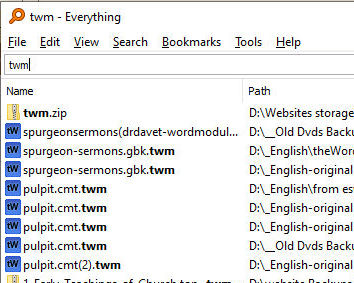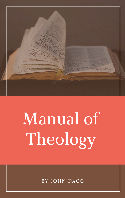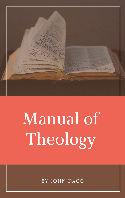Cleveridge Bible Doctrines is a smaller doctrines book 71 pgs which is a good overview of doctrine for new believers.
BIBLE CENTERED STUDIES TEACHER’S HANDBOOK
Ernest A. Clevenger, Jr.
© Copyright, 2011 by Ernest A. Clevenger, Jr.
Published by Clevenger Publications
1136 Lipscomb Drive
Nashville, TN 37204
Email: [email protected]
Permission is hereby given to freely reproduce, use, and/or print this book without additions or deletions or changes of any kind.
BIBLE DOCTRINES BIBLE CENTERED STUDIES TEACHER’S HANDBOOK
By Ernest A. Clevenger, Jr.
Download: clevenger Bible Doctrines cc
Excerpt from book
- ALL SCRIPTURE – Inspired of God.
The English word inspired or inspiration has come down to us through a very unusual course.. Primarily it comes from the Latin word inspiro which means to “breath in”―hence our thought “to breath into the word.” Other common words in this area are pneumonia and pneumatic; as pneumatic tires (tires with air.) What is meant by “inspiration of God” in scripture? Much like “God”, it is not explained but just stated as a fact. The wrong attitude toward what God does, in relation to scriptural inspiration, is probably one of greatest problems. It is best not to think of God breathing “into scripture” but “through the scripture.” Inspiration is more the “how” of revelation (see Term 2); God, working on, in, and through the prophets, apostles, and writers, enabled them to receive and record, in a trust worthy manner, the revelation for man.
The word inspiration, or inspire, is used only twice in most English translations but the idea is expressed throughout scripture by many different words and thoughts: Hebrews 1:1, “God spoke”; Exodus. 3:15, “God said”; II Kings 23:16, “proclaimed”; Isaiah 1:10, “hear the word of Jehovah”; Ezra. 7:1, “the word of the Lord came to me.” Both directly and indirectly, the Old Testament has over 4,000 claims to divine authority. In the New Testament it is well summed up in Matthew 10:19- 20, “When they bring you to trial, do not worry about what you are going to say or how you will say it; when the time comes, you will be given what you will say. For the words you speak will not be yours; they will come from the Spirit of your Father speaking in you.” TEV.
Two N. T. passages, giving most of the inspirational ideas, are:
- II Timothy 3:16-17, “All scripture is inspired by ” Literally it is “God breathed” – a term used only here in all the N. T. Verse 15 calls them holy or sacred writings in that they are “set apart” by God working through them. As God breathes through these writings to us he gives us everything that we need in teachingfor reproof, correction and instruction in righteousness. In this,
10
Paul is giving for Timothy’s direction a brief description of the result of inspiration.
(2) II Peter 1:19-21 gives almost everything we know about how God goes about the process of inspiration. In II Pet. 1:12, Peter admonished them to be established in the truth; now prophetic word is mode more sure as a lamp shining in a dark place. Verse 20 tells that no prophesy of scripture is of one’s own individual interpretation. Verse 21: “for no prophesy (of scripture) came by the will of man but men spoke FROM God, being moved by the Holy Spirit.”
Literally the minds of the prophets were picked up and carried along by the power of the spirit working in them. What happened in the minds of the prophets we are not told―only assured that the words they recorded can be taken as the infallible word of God who spoke through them.
- REVELATION – Uncovering.
The words “revelation” and “inspiration” both come to us through the Latin Bible. The Douay Version, translated from the Latin Bible, uses the Greek word “Apocaplypse” as the title for the last Book in the Bible; most English translations use the Latin word “Revelation”, which means to “uncover” or “unveil”. In scripture, this is the uncovering of the mind of God to the mind of man. In times past, God used different ways to uncover his will to mankind, Hebrews 1:1. Complete revelation came in Jesus Christ: “If you have seen me you have seen the Father,” John 14:9. Revelation has been a gradual thing like the pulling back of a curtain; as man became spiritually capable of knowing more about God, more was revealed to him.
Many things are known to us today which were hidden from great men of the past like Noah, Abraham, Moses and David. Also, there are a number of things that God has reserved to himself. The secret things belong to the Lord but the revealed things belong to us, Deuteronomy 29:29. Our concern should be concentrated on the revealed things. As under inspiration, the holy men of old had things uncovered to their minds by the Spirit. This is the way that God revealed the interpretation of Nebuchadnezzar’s dream to Daniel, (2:19). Again, as shown in Romans 1:20, God uncovers a part of himself in nature; since creation his invisible nature and power has been revealed in the things that are made. The Heavens declare the glory of God and the firmament shows his handiwork, Psalms 19:1.
Important to man today are the specifics of revelation. The Gospel is the power of God to salvation and in it the righteousness of God is revealed through faith, Romans 1:16-17. In I Corinthians 2:6-13 Paul takes up most of the important problems that one now faces. The hidden things of God cannot be found by the wisdom of this world. Part of the process was written by the prophets, Isaiah 64:4; 65:17. “The eye has not seen or ear heard nor heart of man conceived the things God has prepared for those that love him.” God, through the Spirit, has revealed some of these things to Christians. Having the spirit that comes from God, one is able to understand things of the spirit of God― interpreting spiritual truths are for those who possess the Spirit. The non-
11
spiritually minded man is not able to receive these things for they are folly to him, I Corinthians 2:14-15.
- GOD – Creator.
Growing side by side with our great advance of knowledge has been a marked growth in the advocates of the various “theories of evolution.” Most of these spring from the organic evolutionary theory and are in contradiction to the miraculous in creation as set forth in the Bible. The scriptures do not try to defend but just state as a fact what happened ‘‘in the beginning” to bring this material universe into existence.
Chart 1
Genesis 1:1 and John 1:1 simply states, “In the beginning God.” The record does not try to take us back before that time but gives this as an anchor point. The question may then be asked, “Who is God?” The Hebrew word is plural in form and is further explained in Gen. 1:26 when God said, “Let US make man in OUR image.” This is the reflection of the trinity that came to light in the New Testament. In the 0ld Testament the emphasis is on the unity of the godhead. Isaiah 40:28 expresses His creative power, “you have not known, you have not heard? that the everlasting God, the Lord, the CREATOR of the ends of the earth ….“
In the N. T. one finds that Jesus Christ was present and had a definite part in creation; as the WORD he was in the beginning with God and nothing was made without him, John 1:1- 3. Paul further writes about Jesus, “the image of the in visible God, the first born of all creation, for in him were all things created in
12
heaven and earth.” Colossians 1:15-16. The Holy Spirit had part and was present at creation; when the earth was void and without form the SPIRIT of God moved on the face of the deep, Genesis 1:2. The young man Elihu said, “the spirit of God has made me.” Job 33:4.
The relationship between God, Jesus and the Holy Spirit, (sometimes called the “Trinity”) and the separate entities, is shown in Chart 1 above. The scripture passages confirm the person of God, or Jesus and of the Holy Spirit, and the chart shows their relationship and individuality.
In order for there to be a “creation’’ in the Biblical sense it is a matter of bringing something out of nothing; this means material that had not been here before – not just a matter of the rearranging of what already existed. Take for example the creation of man, the crown of God’s creative activity: “In the image of God created he him, male and female created he them,” Genesis 1:27. The Genesis 2 account of creation of woman would take away anything but the miraculous hand of God. Man was created fully grown but incomplete in that he was alone. It was then that God took a rib from Adam and created woman―fully grown―as a helpmeet (helper suitable). God could have created woman as he did man but he did not desire to do so. The great miracle of God’s creative power is all about us.
- THE EARTH – Is the Lord’s (and the fullness thereof) Psalms 24:1.
This term must be associated with the information given in the definition of Term 3 where God is set forth as creator; since God is the creator, the earth and all that is in it belongs to him. It is so easy to forget that God has only entrusted these things to man for his use―not for him to possess or abuse.
In Psalms 24, David, the man of God, acknowledges his relation to God the creator. Recognizing the divine ownership, he is aware that the earth, in the sense of the material things about him, belongs to God; he is only a steward to care and use them to glorify God. David was a man of the outdoors, especially during his youth; no doubt he had many opportunities to experience God’s power in nature. He was close to God and saw man as the height of God’s creative work; he seemed to be able to see things in their proper perspective―the relation between man and the remainder of creation. His understanding of the working of God who made him a man after God’s own heart, Acts 13:22.
The key is that the earth, in its fullness, belongs to God. Man can purchase a small portion of the surface of the earth, or even the mineral rights under the surface, but this portion still belongs to God. The parable about the rich fool, told by Jesus in Luke 12:13 -21, so vividly brings out this lesson. This man, who had a bountiful harvest from the things of the earth, forgot that they were just on loan. When he was ready for his soul to take its ease―ready to eat, drink and be merry―God asked for his soul and posed this question, “who would now receive all his possessions?’’ The wealthiest owner is but a tenant, who may at
13
any moment, receive notice to quit. Let us never forget that the earth, and all its inhabitants, belongs to God. He made everything and remains the sole owner and master.



 Helpful Windows User Tip for "Searching Everything" on your PC.
Helpful Windows User Tip for "Searching Everything" on your PC.
